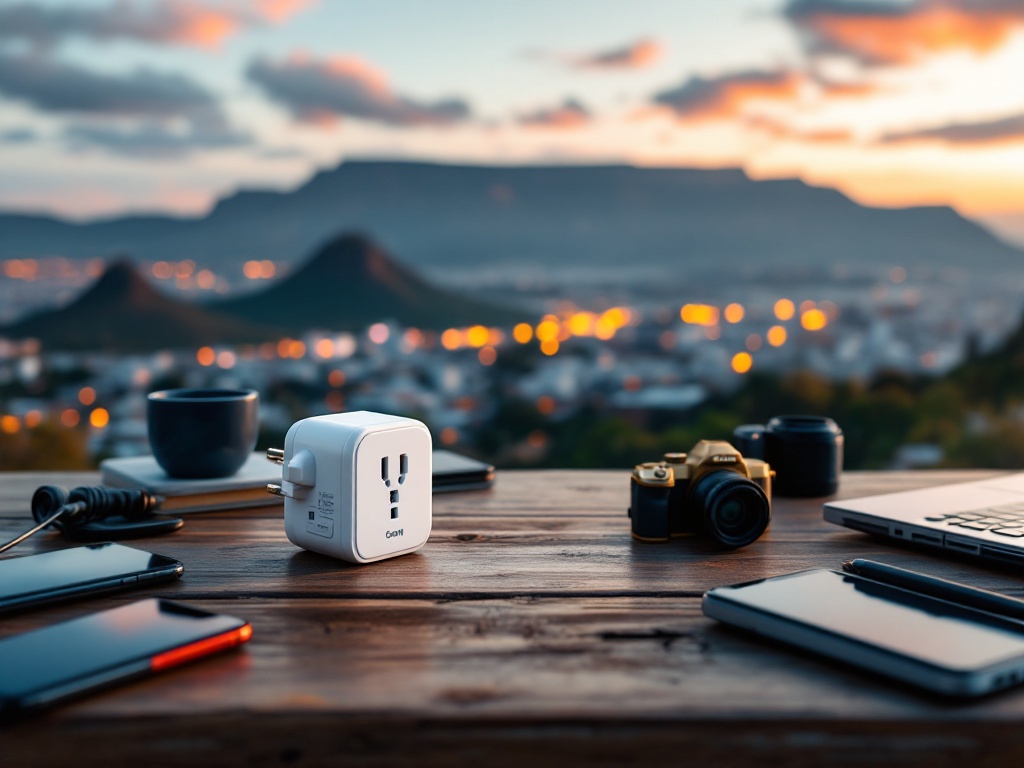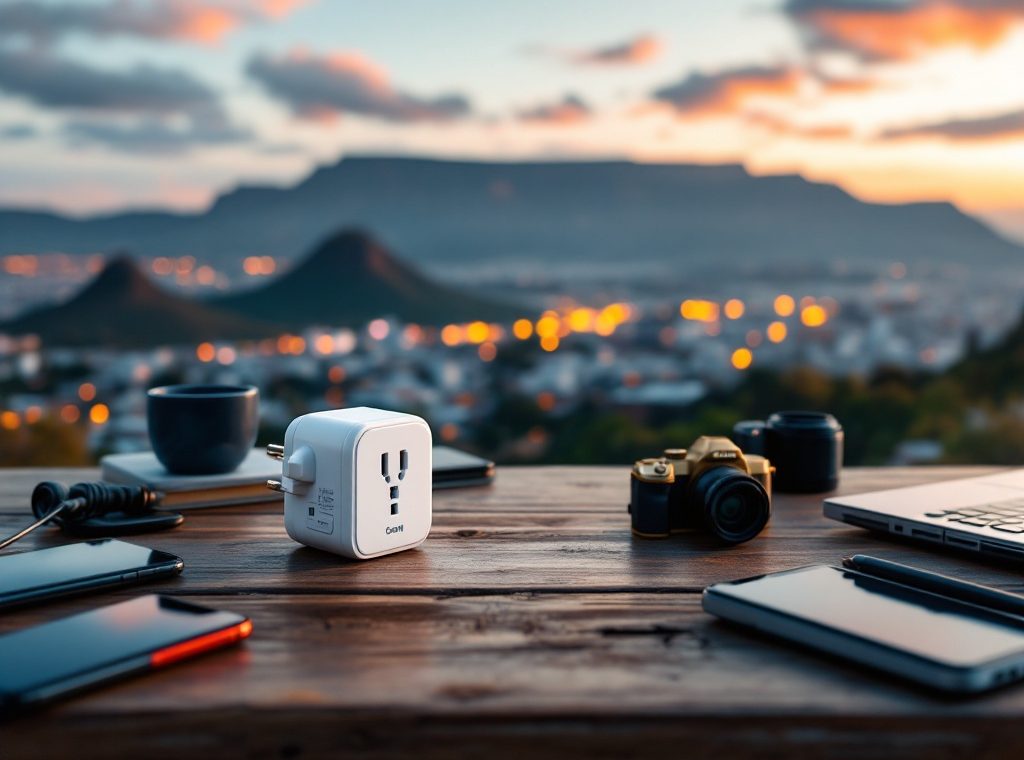Travel Adapter for South Africa: Stay Connected During the Trip
Traveling to South Africa? Don’t let incompatible plugs ruin your trip! South Africa uses unique Type M (round 3-pin) and Type N plugs, along with a 230V/50Hz electrical system. This guide helps you choose the right travel adapter and transformer to keep your devices safe and powered up. Learn about voltage compatibility, grounded vs. non-grounded adapters, and essential safety certifications like CE and RoHS. Discover how to protect your electronics and enjoy a worry-free South African adventure. Read on to prepare for a smooth and electrifying journey!
Important information

- South Africa uses Type M and Type N plugs, primarily Type M (three round prongs).
- The voltage in South Africa is 230V/50Hz. Check your device compatibility to avoid damage.
- A transformer is necessary for devices with motors or heating elements not rated for 230V.
- For safety, use grounded adapters for high-power devices and non-grounded for low-power.
- Look for CE and RoHS certified adapters for safety and environmental compliance.
Understanding Travel Adapter Needs for South Africa
Planning a trip to South Africa? Remember to pack a Type M plug adapter. South Africa uses three-pronged, round-pin plugs, different from UK and US versions. Most international visitors will need an adapter to power their devices. South Africa’s electrical system is 230V/50Hz, which may require a transformer for some appliances, particularly those with motors or heating elements. Using the incorrect adapter or transformer can damage your electronics. Plan ahead for a smooth trip.
Electrical Compatibility and Plug Types
Traveling to South Africa? Remember to pack a power adapter. South Africa primarily uses two plug types: Type M and Type N. The Type M plug has three large, round pins arranged in a triangle. The Type N plug has two round pins and an earth pin. Ensure your adapter is compatible with both Type M and Type N plugs. South African outlets supply 230V at 50Hz, so verify your devices’ compatibility before traveling.
Voltage and Frequency Requirements
South Africa uses a 230V/50Hz electrical system. While most travel adapters support this voltage, it’s important to check your device’s compatibility to avoid damage. Confirming this beforehand can prevent issues during your trip.
Choosing the Right Travel Adapter for South Africa
Traveling to South Africa requires a Type M plug adapter. These adapters have three round pins and are sometimes called round 3-pin plugs. While some adapters also work with the similar Type N plug, ensure yours is specifically Type M compatible.South Africa operates on a 230V/50Hz power system. This differs from the 110-120V systems common in some countries. Verify your devices’ compatibility before plugging them in, as incorrect voltage can cause damage.For added safety, especially with metal-cased devices, consider a grounded adapter. The ground pin offers crucial protection against electric shocks, which non-grounded adapters lack.
Types of Plugs: Round 3 Pin and Type M
Planning a trip to South Africa? Remember to pack the right travel adapter for their unique electrical outlets. You’ll primarily find Type M plugs, distinguished by three large, round pins arranged in a triangle. Type N plugs, also with three round pins but in a slightly different configuration, are also prevalent. A universal adapter is highly recommended for maximum compatibility, ensuring you can charge your devices wherever you go. While some places may have the more familiar Type C sockets, relying solely on them isn’t advisable.
Understanding Voltage: 230V and 50Hz Standards
South Africa uses a 230V/50Hz electrical system. Check if your devices are compatible with this voltage. If your devices support a range that includes 230V, you probably won’t need a voltage converter. However, older appliances might require one. South African outlets utilize the type M plug, identifiable by its three round pins.
Grounded vs Non-Grounded Adapters
Grounded Adapters
For high-power appliances like hair dryers and travel irons, grounded adapters offer enhanced safety. They channel excess electrical current to the earth, minimizing potential hazards. This grounding is crucial for devices with motors or heating elements.
Non-Grounded Adapters
Non-grounded adapters, lacking the grounding feature, are better suited for low-power devices. These include phone and laptop chargers. As a bonus, these smaller adapters are often more portable.
Key Features of a Travel Adapter for South Africa
Travel light with the compact DB-10L adapter, perfect for tight luggage spaces. This handy device supports both American two and three-prong plugs, powering electronics like laptops, smartphones, and cameras. The 100-240V compatibility ensures use with devices from various regions, accommodating different voltage requirements.
Compact and Travel-Friendly Design
For travelers, portability is essential, and a compact design, like that of the DB-10L adapter, makes all the difference. Its small size simplifies packing and proves incredibly convenient on the go.
Compatibility with American 2 and 3 Prong Plugs
The DB-10L travel adapter is designed for US travelers, accommodating both two and three-prong American plugs. This versatile adapter allows you to use various devices with a single unit.
Multi-Voltage Support for Various Devices
The DB-10L adapter is a multi-voltage device that supports a wide range of voltages, including up to 250V. This versatility makes it compatible with various electronics, from chargers to larger appliances, offering a practical power solution.
Ensuring Electrical Safety During Your Trip
For seamless travel, prioritize packing dual-voltage appliances (110V-230V compatible) whenever possible.
If single-voltage devices are unavoidable, a transformer is crucial to protect motor-driven or heated appliances from damage.
Choose CE certified and RoHS compliant adapters to ensure safety and optimal device performance.
Understanding Dual and Single Voltage Rated Appliances
Dual Voltage Appliances
Dual voltage appliances offer the convenience of working on both 110V and 230V systems. This means they can be used in various countries without needing a voltage converter.
Single Voltage Appliances
Single voltage appliances operate only on their designated voltage. For example, a 110V device requires a transformer in South Africa, which uses a 230V system. Using an incorrect voltage can damage your appliance.
Using a Transformer for Devices with Motors or Heaters
Planning a trip to South Africa? Ensure your electrical devices are compatible with the local voltage. South Africa uses a 230V system, which may differ from your home country. Using a transformer is often necessary to prevent damage to devices like hair dryers, straighteners, and shavers. Check the voltage compatibility of your devices before plugging them in to ensure safe usage.
CE Certified and RoHS Compliant Adapters
CE and RoHS certifications are essential indicators of a safe and environmentally responsible adapter. CE marking signifies compliance with European safety and performance standards, while RoHS certification restricts the use of hazardous substances, minimizing environmental impact. Choosing certified adapters ensures a higher-quality product and reduces potential risks to your devices. Look for the CE and RoHS marks for peace of mind, knowing you’re contributing to a healthier planet and protecting your electronics.













